2025届高三英语二轮专项复习 2021高考乙卷阅读(B)篇 课件(共22张PPT)
文档属性
| 名称 | 2025届高三英语二轮专项复习 2021高考乙卷阅读(B)篇 课件(共22张PPT) |
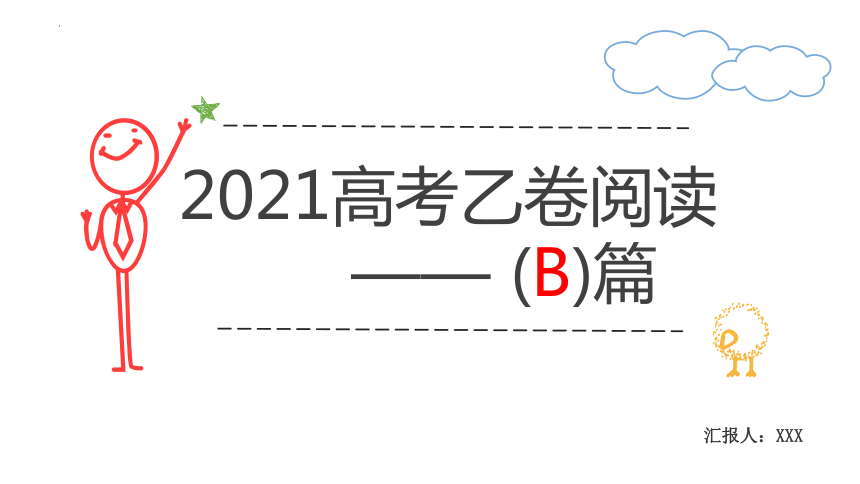
|
|
| 格式 | pptx | ||
| 文件大小 | 855.0KB | ||
| 资源类型 | 教案 | ||
| 版本资源 | 通用版 | ||
| 科目 | 英语 | ||
| 更新时间 | 2024-09-12 00:00:00 | ||
图片预览


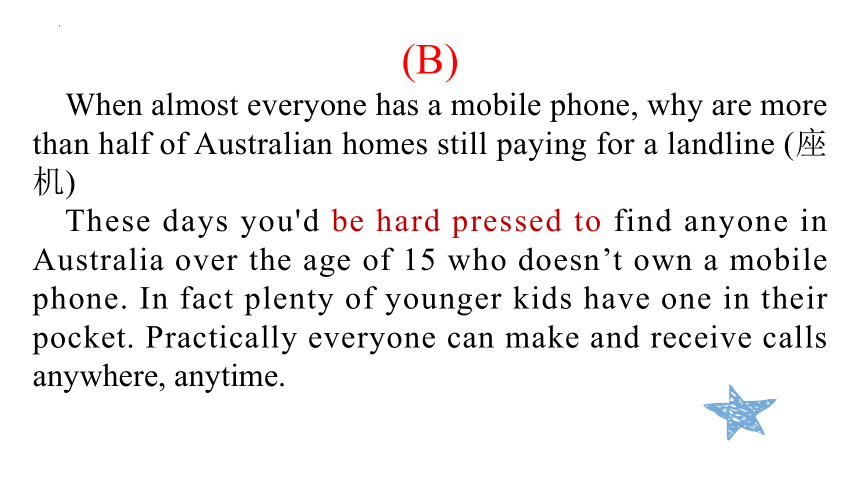
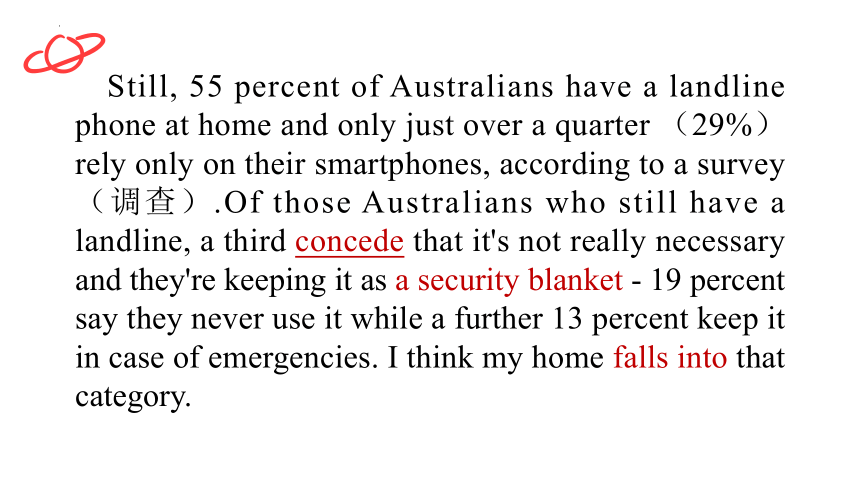
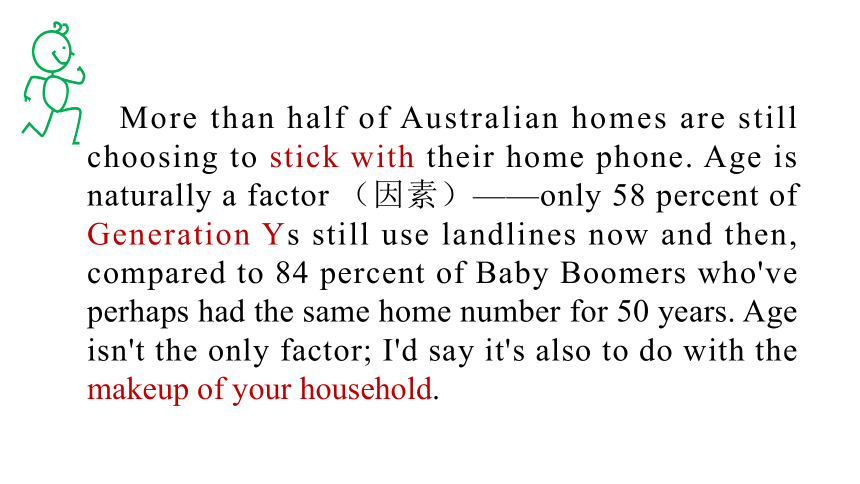

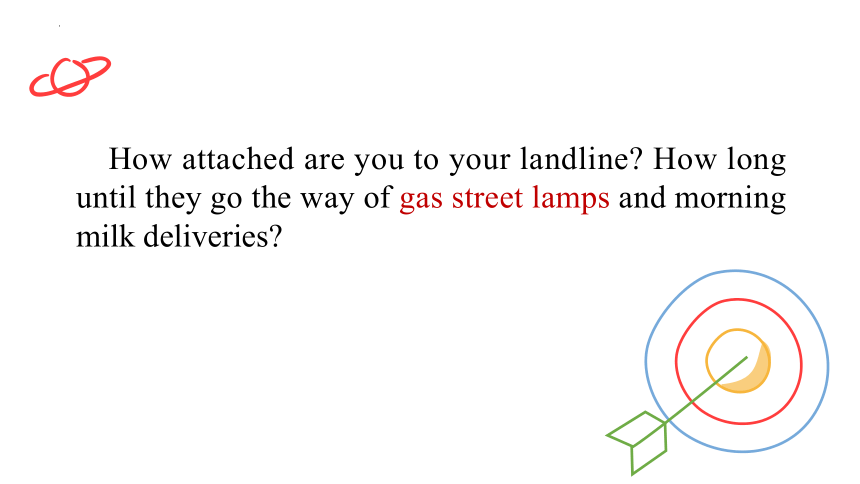
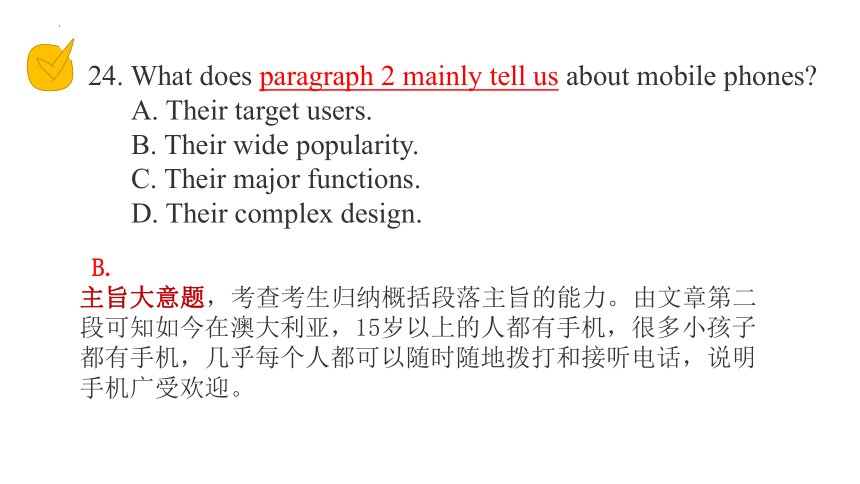
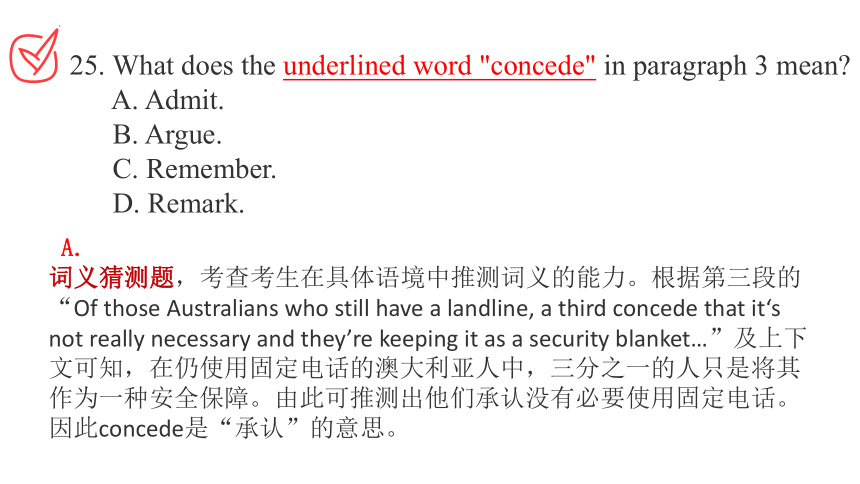
文档简介
(共22张PPT)
2021高考乙卷阅读
—— (B)篇
汇报人:XXX
1.主题语境
2.语篇类型
3.文章出处
4.文章结构
目 录/contents
5.语意语块
6.文化知识
(B)
When almost everyone has a mobile phone, why are more than half of Australian homes still paying for a landline (座机)
These days you'd be hard pressed to find anyone in Australia over the age of 15 who doesn’t own a mobile phone. In fact plenty of younger kids have one in their pocket. Practically everyone can make and receive calls anywhere, anytime.
Still, 55 percent of Australians have a landline phone at home and only just over a quarter (29%) rely only on their smartphones, according to a survey (调查).Of those Australians who still have a landline, a third concede that it's not really necessary and they're keeping it as a security blanket - 19 percent say they never use it while a further 13 percent keep it in case of emergencies. I think my home falls into that category.
More than half of Australian homes are still choosing to stick with their home phone. Age is naturally a factor (因素)——only 58 percent of Generation Ys still use landlines now and then, compared to 84 percent of Baby Boomers who've perhaps had the same home number for 50 years. Age isn't the only factor; I'd say it's also to do with the makeup of your household.
Generation Xers with young families, like my wife and I, can still find it convenient to have a home phone rather than providing a mobile phone for every family member. That said, to be honest the only people who ever ring our home phone are our Baby Boomers parents, to the point where we play a game and guess who is calling before we pick up the phone (using Caller ID would take the fun out of it).
How attached are you to your landline How long until they go the way of gas street lamps and morning milk deliveries
24. What does paragraph 2 mainly tell us about mobile phones
A. Their target users.
B. Their wide popularity.
C. Their major functions.
D. Their complex design.
B.
主旨大意题,考查考生归纳概括段落主旨的能力。由文章第二段可知如今在澳大利亚,15岁以上的人都有手机,很多小孩子都有手机,几乎每个人都可以随时随地拨打和接听电话,说明手机广受欢迎。
25. What does the underlined word "concede" in paragraph 3 mean
A. Admit.
B. Argue.
C. Remember.
D. Remark.
A.
词义猜测题,考查考生在具体语境中推测词义的能力。根据第三段的“Of those Australians who still have a landline, a third concede that it‘s not really necessary and they’re keeping it as a security blanket…”及上下文可知,在仍使用固定电话的澳大利亚人中,三分之一的人只是将其作为一种安全保障。由此可推测出他们承认没有必要使用固定电话。因此concede是“承认”的意思。
26. What can we say about Baby Boomers
A. They like smartphone games.
B. They enjoy guessing callers’ identity.
C. They keep using landline phones.
D. They are attached to their family.
C.
推理判断题,考查考生理解文中细节信息并作出简单推理的能力。根据文章第四段第二句“…compared to 84 percent of Baby Boomers who’ve perhaps had the same home number for 50 years.”可知,84%的婴儿潮一代可能50年以来都没换过家庭电话号码,由此可推断出他们一直在使用座机。
27. What can be inferred about the landline from the last paragraph
A. It remains a family necessity.
B. It will fall out of use some day.
C. It may increase daily expenses.
D. It is as important as the gas light.
B.
推理判断题,考查考生理解文中细节信息并作出简单推理的能力。根据最后一段“How attached are you to your landline How long until they go the way of gas street lamps and morning milk deliveries ”可知,煤气路灯和早晨送奶已经过时,将座机作对比,可推断出座机也会和它们一样,迟早会被时代抛弃。
01
主题语境:
人与社会——科学与技术——科技发展
02
语篇类型:说明文
介绍澳大利亚人家里保留座机的现象及原因,引导学生关注科技发展前沿,养成科学探究的精神。
03
文章出处:
https://www..au/technology/when-will-aussies-retire-their-home-phone-20170731-gxm209.html
The Sydney Morning Herald
悉尼先驱晨报
04
文章结构:
05
语意语块:
1. be hard pressed to do sth. 难以做到某事
2. a security blanket安全保障
3. stick with 坚持使用
4. fall into 属于(某类、群体等)
5. makeup of your household家庭构成
6. go the way of走……的道路,重蹈……的覆辙
7. gas street lamps煤气路灯
8. target users目标用户
9. daily expenses日常开支
05
语意语块:
① Of those Australians who still have a landline, a third concede that it's not really necessary and they're keeping it as a security blanket —— 19 percent say they never use it while a further 13 percent keep it in case of emergencies.
语法:(1)…who still have a landline…此处who引导定语 从句,修饰Australians。
(2)…while a further 13…此处while表示然而,属于连词。
05
语意语块:
② That said, to be honest the only people who ever ring our home phone are our Baby Boomers parents, to the point where we play a game and guess who is calling before we pick up the phone (using Caller ID would take the fun out of it).
语法:(1)…to the point where we play a game…此处where引导定语从句,修饰point地步。
(2)…guess who is calling…此时who引导宾语从句。
(3)…before we pick up the phone..此时before引导时间状语从句,表示“在…之前”。
词汇:Caller ID 来电显示
06
baby boomer:英文中把在婴儿潮时期出生的婴儿称为“baby boomer”。婴儿潮(baby boom)这个词的首次出现,主要是指美国第二次世界大战后的“4664”现象--从1946年至1964年,这18年间婴儿潮人口高达7800万人。
文化知识:
06
Generation X:“X代”或“X代人”一语首创于加拿大作家道格拉斯·库普兰所著《X代:加速文化的故事》(1991)一书的书名。作者在书中着力描述刻画了这代人(“X代人”大致出生于1965—1980这个年代)的处世态度。因他们对前途无法预定,又不愿从事、采取已适应于他们父辈的职业和生活方式。这样,他们的人生品质便成了“未知”或“虚无”的。为此,作者便冠以这代人为“X代人”这一称谓了(X表示“未知数”)
文化知识:
06
Generation Y:(Y一代:1981-1995)指20世纪80年代后至本世纪初出生的美国年轻人。“Y一代”乐观自信,执着坦率,有主见,知识面广。对“Y一代”而言,自主创业已成了他们生存的安全网,他们借助互联网成长。
文化知识:
Thanks for your listening!
2021高考乙卷阅读
—— (B)篇
汇报人:XXX
1.主题语境
2.语篇类型
3.文章出处
4.文章结构
目 录/contents
5.语意语块
6.文化知识
(B)
When almost everyone has a mobile phone, why are more than half of Australian homes still paying for a landline (座机)
These days you'd be hard pressed to find anyone in Australia over the age of 15 who doesn’t own a mobile phone. In fact plenty of younger kids have one in their pocket. Practically everyone can make and receive calls anywhere, anytime.
Still, 55 percent of Australians have a landline phone at home and only just over a quarter (29%) rely only on their smartphones, according to a survey (调查).Of those Australians who still have a landline, a third concede that it's not really necessary and they're keeping it as a security blanket - 19 percent say they never use it while a further 13 percent keep it in case of emergencies. I think my home falls into that category.
More than half of Australian homes are still choosing to stick with their home phone. Age is naturally a factor (因素)——only 58 percent of Generation Ys still use landlines now and then, compared to 84 percent of Baby Boomers who've perhaps had the same home number for 50 years. Age isn't the only factor; I'd say it's also to do with the makeup of your household.
Generation Xers with young families, like my wife and I, can still find it convenient to have a home phone rather than providing a mobile phone for every family member. That said, to be honest the only people who ever ring our home phone are our Baby Boomers parents, to the point where we play a game and guess who is calling before we pick up the phone (using Caller ID would take the fun out of it).
How attached are you to your landline How long until they go the way of gas street lamps and morning milk deliveries
24. What does paragraph 2 mainly tell us about mobile phones
A. Their target users.
B. Their wide popularity.
C. Their major functions.
D. Their complex design.
B.
主旨大意题,考查考生归纳概括段落主旨的能力。由文章第二段可知如今在澳大利亚,15岁以上的人都有手机,很多小孩子都有手机,几乎每个人都可以随时随地拨打和接听电话,说明手机广受欢迎。
25. What does the underlined word "concede" in paragraph 3 mean
A. Admit.
B. Argue.
C. Remember.
D. Remark.
A.
词义猜测题,考查考生在具体语境中推测词义的能力。根据第三段的“Of those Australians who still have a landline, a third concede that it‘s not really necessary and they’re keeping it as a security blanket…”及上下文可知,在仍使用固定电话的澳大利亚人中,三分之一的人只是将其作为一种安全保障。由此可推测出他们承认没有必要使用固定电话。因此concede是“承认”的意思。
26. What can we say about Baby Boomers
A. They like smartphone games.
B. They enjoy guessing callers’ identity.
C. They keep using landline phones.
D. They are attached to their family.
C.
推理判断题,考查考生理解文中细节信息并作出简单推理的能力。根据文章第四段第二句“…compared to 84 percent of Baby Boomers who’ve perhaps had the same home number for 50 years.”可知,84%的婴儿潮一代可能50年以来都没换过家庭电话号码,由此可推断出他们一直在使用座机。
27. What can be inferred about the landline from the last paragraph
A. It remains a family necessity.
B. It will fall out of use some day.
C. It may increase daily expenses.
D. It is as important as the gas light.
B.
推理判断题,考查考生理解文中细节信息并作出简单推理的能力。根据最后一段“How attached are you to your landline How long until they go the way of gas street lamps and morning milk deliveries ”可知,煤气路灯和早晨送奶已经过时,将座机作对比,可推断出座机也会和它们一样,迟早会被时代抛弃。
01
主题语境:
人与社会——科学与技术——科技发展
02
语篇类型:说明文
介绍澳大利亚人家里保留座机的现象及原因,引导学生关注科技发展前沿,养成科学探究的精神。
03
文章出处:
https://www..au/technology/when-will-aussies-retire-their-home-phone-20170731-gxm209.html
The Sydney Morning Herald
悉尼先驱晨报
04
文章结构:
05
语意语块:
1. be hard pressed to do sth. 难以做到某事
2. a security blanket安全保障
3. stick with 坚持使用
4. fall into 属于(某类、群体等)
5. makeup of your household家庭构成
6. go the way of走……的道路,重蹈……的覆辙
7. gas street lamps煤气路灯
8. target users目标用户
9. daily expenses日常开支
05
语意语块:
① Of those Australians who still have a landline, a third concede that it's not really necessary and they're keeping it as a security blanket —— 19 percent say they never use it while a further 13 percent keep it in case of emergencies.
语法:(1)…who still have a landline…此处who引导定语 从句,修饰Australians。
(2)…while a further 13…此处while表示然而,属于连词。
05
语意语块:
② That said, to be honest the only people who ever ring our home phone are our Baby Boomers parents, to the point where we play a game and guess who is calling before we pick up the phone (using Caller ID would take the fun out of it).
语法:(1)…to the point where we play a game…此处where引导定语从句,修饰point地步。
(2)…guess who is calling…此时who引导宾语从句。
(3)…before we pick up the phone..此时before引导时间状语从句,表示“在…之前”。
词汇:Caller ID 来电显示
06
baby boomer:英文中把在婴儿潮时期出生的婴儿称为“baby boomer”。婴儿潮(baby boom)这个词的首次出现,主要是指美国第二次世界大战后的“4664”现象--从1946年至1964年,这18年间婴儿潮人口高达7800万人。
文化知识:
06
Generation X:“X代”或“X代人”一语首创于加拿大作家道格拉斯·库普兰所著《X代:加速文化的故事》(1991)一书的书名。作者在书中着力描述刻画了这代人(“X代人”大致出生于1965—1980这个年代)的处世态度。因他们对前途无法预定,又不愿从事、采取已适应于他们父辈的职业和生活方式。这样,他们的人生品质便成了“未知”或“虚无”的。为此,作者便冠以这代人为“X代人”这一称谓了(X表示“未知数”)
文化知识:
06
Generation Y:(Y一代:1981-1995)指20世纪80年代后至本世纪初出生的美国年轻人。“Y一代”乐观自信,执着坦率,有主见,知识面广。对“Y一代”而言,自主创业已成了他们生存的安全网,他们借助互联网成长。
文化知识:
Thanks for your listening!
